ACADEMIC PRESENTATIONS!
i’ve gotten a million asks about presentations! and presentation nerves! and presentation prep! so here is a long-ass post about:
ACADEMIC PRESENTATIONS!
every presentation is different and will have a different context. this advice is for seminar/class presentations, not conference panels, and based on my experience as an english lit grad student (and teacher). some classes you feel comfortable joking in; others, the vibe (or the professor’s expectations) will be more formal. read the room!!
a good presentation is one that communicates clearly. in other words, it’s more important to be legible to your audience than it is to “sound smart.” usually when you’re consciously working to sound smart, you sound like an asshole. as the genie in aladdin once said, bee yourself.
be generous to your audience. if you conceptualize your presentation as having two parts, let them know that! “i want to do two things with this presentation: talk about this secondary text, and then identify some examples that we can talk about in the primary.” signpost that shit! let your audience know where you’re heading and what you want them to understand.
related: present on something interesting. this does not mean objectively interesting. it means you should find something that really gets you curious or passionate or annoyed! 99% of the time, if you’re invested, your audience will be invested.
K.I.S.S. only use a powerpoint if you have images that support or contribute to your presentation. no distracting backgrounds, special effects, or clip art, it’s not 1998 (unless you are going for a retro vibe, in which case, don’t let me stop you). no big blocks of text. only use prezi if you want to make your audience nauseous. if you’re using a handout for quotations or major points, keep it basic and readable.
plan your ending. there is nothing worse than a presentation that ends with a “so uh… yeah………………..” suggestions:
stick the landing. in other words, do the oral version of an essay conclusion: why it matters, how your presentation impacts the understanding of the topic, etc.
questions for further discussion, the kind you have some answers for or thoughts about.
legitimate questions that you don’t have answers for! not factual ones, obviously, but questions about a tricky scene in the text, how a particular narrative form is working, moments that you’ve identified that actually work against your conclusions, etc. it’s okay to admit that you don’t have all the answers; in fact, it’s a sign that you’re really engaging with the material. just make sure you use this one on a presentation where you’ve already proven that you did a lot of work and know your shit.
imitate what you like to see. i’ll hazard a guess and say that most people enjoy presentations that allow some personality, or we’d just have siri read our papers out loud. my usual presentation style is on the informal side; after 3 years of small seminars with the same people and professors, i feel comfortable joking around with the folks in my area. if i were to present for my whole department, i would not be that chill.
personalize your notes. you’re the only one who’s gonna see them! make them useful to you.
don’t be nervous. not helpful, i know, but as someone who actually likes giving presentations but still gets anxious: it’s going to be okay. presentations can be a great chance to talk about something you find interesting, to direct class discussion, and to dig deeper into material that you might skim over otherwise. understand that your classmates will usually be generous and sympathetic (see: seminar personalities). treat it like an opportunity, not a punishment.
okay this is not really general advice, but it’s a plug for a grad school presentation favorite that will make your life way easier: the pdf handout.
it doesn’t have to be hard copy (though you should probably bring a few just in case). if everyone in your seminar has a laptop or tablet, email that thing out the night before! they get a lil preview and a document they can refer to in the future; you get to combine hi-res color images, hyperlinks, and whatever text you need to include.
still keep it minimalist. you can go overboard with your personal notes. the only things that should go on the handout are
things that are better written down than spoken (long quotes, statistics, timelines, etc.)
things that will contribute to your audience’s understanding of the material.
and here is an example of the difference b/t notes and handout, from a presentation i did last fall on my husband thomas hoccleve n scholarly fatigue (i was rly tired and wanted to talk abt being Weary)
my notes on hoccleve’s work life:

the handout version that i emailed to everyone in the course:

More Posts from Swirlspill-study and Others

Read JY Yang’s “Waiting on a Bright Moon”, a story of rebellion among far-flung colonies united by song magic.
Xin is an ansible, using her song magic to connect the originworld of the Imperial Authority and its far-flung colonies— a role that is forced upon magically-gifted women “of a certain closeness”. When a dead body comes through her portal at a time of growing rebellion, Xin is drawn deep into a station-wide conspiracy along with Ouyang Suqing, one of the station’s mysterious, high-ranking starmages.
random things I do to fool my brain into staying interested during online study
changing my chrome cursor into something cute like a strawberry
changing my chrome theme to a wacky colour
adding stickers onto my laptop
listening to new music in a language I don’t know
or hyped video game music for energy
buying a fidget toy. like deadass I had my doubts but they’re so good
using the web paint extension while in meetings or lectures
changing the appearance of whatever note taking app you use
for epic gamers with light-up keyboards, changing the light’s colour settings
having a very hot or very cold drink
putting said drink directly under my face when working and using a straw, so I don’t forget it’s there and don’t have to move my head much to sip
hav u eaten or drank anything today hey hello it’s already midday
sparkling water perchance?? it’s water but it’s fun and interesting
ambient fireplace 10 hours loop
alternatively, death metal hardcore bass boosted.mp3
putting on a ridiculous outfit and pretending you’re a wizard doing important work. I have given up on being “put together” at this stage
getting up and having scheduled dance breaks to move around
don’t like your chair? are u gay and can’t sit normal? try arranging pillows and boxes to make a diy cross-legged chair or sit on the floor
u kno when you get a million ideas during studying but u don’t want to break focus: hey siri okay google alexa remind me in a sec about this very specific thing that just couldn’t wait 10 more minutes to force itself into brain
giving up. lmao sometimes you genuinely need a break and nothing you do will make your brain focus so don’t feel guilty for needing rest! it’s technically more productive to spend the time resting and recharging than forcing yourself to half assedly focus and get nothing done
tl;dr- changing appearances of devices often for Spice, having small snacks and various drinks, hype music for energy, any and all fidget toys, knowing when to give up
How to Read From a Textbook
Hi guys! So I’ve noticed that a lot of people, including myself, struggle with reading directly from a textbook and actually retaining all of the information.
Well my friends I am here to change that [queue the victory music]. Recently I discovered a reading strategy known as the SQ3R technique. It stands for Survey, Question, Read, Recite, Review. I’ve found this technique to be extremely helpful when it comes to reading through textbooks, and so now I’m passing this information onto my dear followers.
1. Survey
The first step in this process is to get a basic idea of what you’re going to be reading. Most textbooks have chapter outlines or a brief summary at the beginning of each chapter. Take about five minutes to skim through these. By doing this, you’ll have the basic structure of what you’ll be learning in your head.
2. Question
This step will be repeated multiple times throughout your reading, so pay attention! Within each chapter, there are section titles that give you a vague idea of what the next few paragraphs will be about. This step asks that you turn the section title into a question. For example, we’ll say that our section title is “The Changing Role of the States.” You can turn this into questions such as “how did the role of the states change” and “which states changed and how.” When you turn the titles into questions, you end up looking for the answers while you’re reading rather than simply reading. This stops you from reading the same line over and over again.
3. Read
This one’s the obvious one. Read your textbook. Take notes while you’re reading. Write down all the important definitions, concepts, names, dates, etc. But remember to take breaks! Taking a three minute break for every twenty minutes of reading allows information to settle in your brain. It also helps with memory retention.
4. Recite
I’ll admit I’m still a bit uncomfortable with this step but it’s helped me a lot with remembering what I’ve read. Basically, this step asks you to summarize what you’ve just read out loud. I do this after each section, and then I summarize the whole chapter once I’ve finished the chapter. (Pro Tip: If you’re uncomfortable with talking to yourself, try talking to a recording device or summarize to a nearby friend.)
5. Review
Review, review, review. I cannot stress this enough. Read over your notes the day after, then the week after. Studies show that you remember 60% more of the material you learned when you review it the next day. Don’t forget you can review with more than just your notes! Make flashcards or foldables with the most important information in the chapter and quiz yourself! So many textbooks have quizzes online for each chapter, so use them!!!! I find mind maps to be super helpful in studying too. Reviewing is a super important step, so don’t think that you can forget about studying just because you’ve read through a chapter!
I might include that, as of recent, many professors have been saying that there is a fourth ‘R’ to this process: Relate. With this step you simply relate the information you’ve just read back to something important in your life. When you make connections with your reading, it becomes easier to remember the material.
Well that’s all I’ve got for you guys for now. I hope this helps at least a few of you. Keep on studying guys, and good luck on finals! ╚(•⌂•)╝

i was terrified of doing this in undergrad, and now that i’m asked to write them fairly often, i am fondly exasperated when my students don’t know how to ask for them. obviously there’s no single way, but here’s the way i usually do it.
(obviously ask in person if you can! but email is also fine.)
THE FIRST EMAIL
should be short & should mainly be asking whether they’re willing to write you the letter
should provide only the basics - what the professor absolutely needs to know.
the position you’re applying for
when the letter would be due
optional: if you’re afraid they won’t remember you, a quick line identifying yourself & your relation to them
i like to provide an “out,” in case they don’t want to or are unable to write the letter
SAMPLE Dear Professor X, I’m applying for a job as an English tutor at the University Student Resource Center, and was wondering if you’d be willing to write me a letter of recommendation for the position. [optional identification: I really enjoyed taking English 300 with you in Winter 2016, and I’m hoping to develop and pass on those skills to other students through this job.] The letter would be due by September 1st - I know you’re very busy, so I completely understand if you’re not able to write one. All best, Your Name
THE SECOND EMAIL
they said yes!! amazing.
this one can provide a little more information – a link to the job posting, if there is one, or you can write a quick summary of the position, plus a sentence or two about why you’re excited/interested in the job.
also tell them where to send the letter!!
directly to the recruiter for the job
to you, to add to your application packet
upload to an online LoR service or to an application website
99% of the time folks are fine with receiving electronic copies, but if they need to mail a hard copy, let them know up front.
SAMPLE: Dear Professor X, Thank you so much! I really appreciate it. Here’s the link to the job listing; the letter should be sent as a .pdf file to the email address at the bottom of the page, anytime before 9/1. Thanks again – I’m hoping that this job will provide me with some teaching experience and the opportunity to work on my own writing. Please let me know if you need any more information! Best, Your Name
WHEN TO SEND A FOLLOW-UP
these stress me out real bad but here’s the deal: most professors have a very shaky relationship to deadlines (especially when they have half a dozen more important ones than your piddly LoR).
the upshot: do not be afraid to nudge them.
often they need the nudge and are appreciative of it.
when that nudge happens is up to you and how much room you’ve given them before the deadline, and it’ll look different depending on your relationship with that professor.
GRAD SCHOOL LETTERS
i offered to send my professors essays that i had written for their classes, especially if i had taken those classes more than a year before asking them to write the letter, just so they could refamiliarize themselves with my work. you can also offer to send them your writing sample, if you haven’t already asked them to look it over for you.
honestly i’d recommend asking for these in person bc it’ll give you a chance to talk to them about their grad school experience and your own hopes & aspirations, which will help them write a more personal, fleshed-out letter.
one important note: if this letter is intended for use in grad school applications, do not stress out if it’s a little late. most programs do not care, and pretty much all of them accept late letters without a problem. your professor’s ability to meet deadlines does not reflect on you, and professors are intimately familiar with running late on LoRs. they really honestly don’t care. as long as it gets there before too long, you’ll be fine.
thank-yous are up to you! keep in mind that many departments have policies about gift-giving. i did give thank-yous to my three major letter writers, but they were handwritten cards & homemade cookies, nothing store-bought or expensive.
how i use notion #1: mega assignment list
i promised i would update this from last year, and decided to do a walkthrough for @sleepanon!
i’ve taken my school bujo-ing digital for the past year, so i’m going to create a mini-series of how i’ve tinkered with notion to make it work for me! there’s a fair learning curve to it, so my inbox is open for questions if you have any from my posts (not notion in general. ..i’m not an expert lol).
step 1: start a new page! under database, select table

step 2: rename the labels to assignments and class (leave Files alone) for now. you can also title the page and add icons/covers


step 3: select the files label, then under ‘property type’ change it to ‘date’ (this is for deadlines–i start with my official syllabus dates)

ALSO a part of step 3, but after changing to the deadline property, add another one! click that next label, and follow the same menu as above, but select checkbox to give you an option to ‘complete’ your tasks:

step 4: in the ‘class’ row (the first blank after the label), type in a course name to create a tag. once you do so, you can select the tag to edit it or change colors // you can repeat this step as many times as you need to for your assignments. i like to do my entire semester at once since i work ahead of the syllabus, but it might be good to take it month by month!

step 5: now, let’s add the calendar view. on the lefthand side, ‘add view’, name it, then select calendar (not just highlight like me, but click it!)

step 6: you should now see your assignments on the calendar. on the right side (top) of the calendar, click ‘properties’ and turn everything on!


you can also filter the calendar to only show completed/non completed tasks or by class:


and you can click on any assignment to open it, and add further properties:

again, if you have any questions about this, please let me know!
hi chelsea!! i'm an undergrad student right now, considering a career in academia. my adviser and all my professors tell me i have a lot of potential and i love the idea of spending my life teaching and doing research, but i've read so many horror stories about people trying to find & keep jobs and eventually leaving academia. i was wondering if you had any insight or advice, maybe even places where i could find a more positive & encouraging (but still realistic) perspective. thank u!!
i’m not sure i’m in a great place to answer this for you! the realistic picture is just… not encouraging. finding someone who’ll say “of course you’re going to get a job!” might make you feel better temporarily, but that person is lying to you, and the lie is going to come back around and hurt worse in five years or so.
in other words, the horror stories are ubiquitous because the experience is ubiquitous (and tbh, though quit lit has def blossomed over the last few years, there’s still a far greater number of people leaving academia than are represented in those accounts–many people see leaving as “washing out” or admitting defeat, and don’t talk about their decisions to go).
this is not to say that you shouldn’t go into academia. but as i tell my own mentees, you should not go into academia with the expectation of getting a job at the end. i went into grad school because i liked doing the work, and because i did some self-assessment and concluded that even if i didn’t leave six years later with a tenure-track teaching job, i wouldn’t regret taking the time & doing the work to get the doctorate. then i sat down and had a little chat with myself two-ish years ago and decided that yes, i was going to Go For It, which has meant avoiding quit lit for my own mental health and focusing on the positives (your professors! those are the extant examples of people who got the kind of research & teaching job you want!). asking your advisors about this directly is a great place to start; you can also read karen kelsky’s the professor is in, which i’ve mentioned here a few times, for a fairly realistic description of what the market is like at the moment.
Where to save up to $1600.00 in college supplies.
After the Stafford loan interest rate hike I researched further into ways to save for school and found some pages that would cover most of your basic college needs past textbooks. If you find cheaper things let me know and I’ll show those off too. If you need help researching a specific item feel free to lmk, I’m willing to help you out in my spare time.
Textbooks
Scientific Calculators
Tablets and Computers
Headphones from $9.99
Notebooks and Writing Pads
Pack of Highlighters from a dollar
Towel Sets, Mattress pads, and Desk chairs
Dining Essentials for a Dorm or small Apartment
Backpacks and laptop carriers
Cell Phone Accessories
External Hard Drives
Printers and Ink
Mini-Fridge
Best of luck!

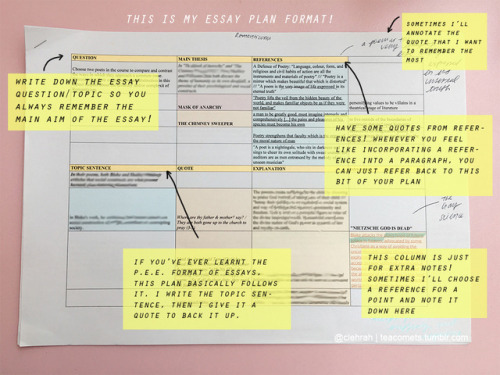
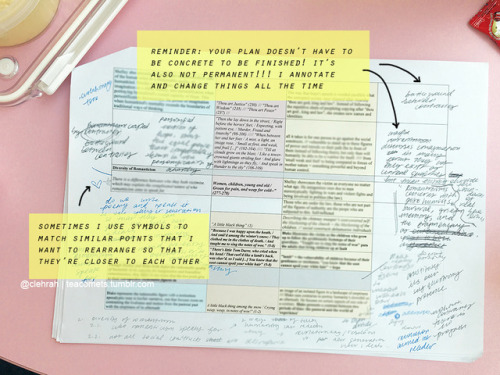
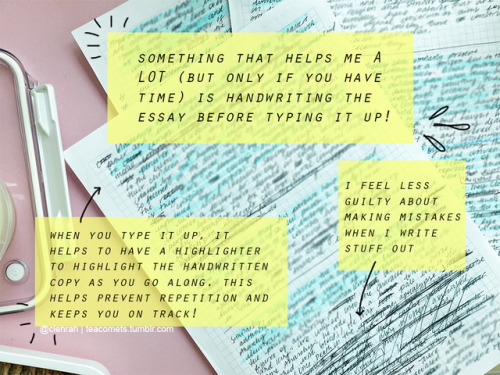
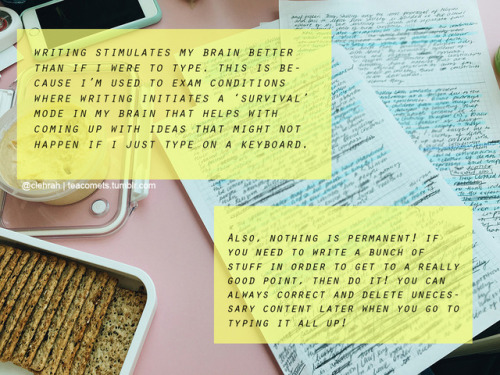

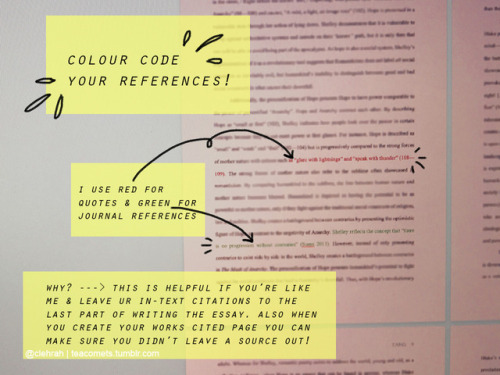
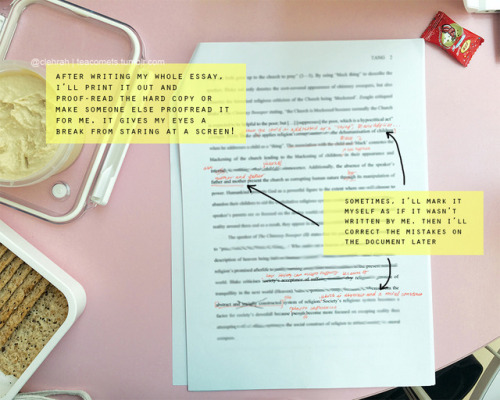

a small guide on how i battle my essays! (click on an image to view it clearer)
(keep in mind: i’m an english major so a majority of my essays are literature-focused!)
these are just some of the methods i want to share that work for me when i write my innumerable amount of essays! i’m definitely a huge planner so it’s no secret that i spend a lot of time on an essay. if you’re a deadline fighter, these tips might not necessarily be helpful (especially the handwriting one). but i hope this gives you an insight on how i write my essays! 🌈
This website is helpful, especially if you’re new to academic writing! You can select what section of your study you’re writing about and then it provides you with example phrases for different parts of that section. I find this super useful when I feel like I’m repeating myself or I know what results I want to describe but I don’t know how to say it. Here’s an example below:

hi! i'm in my undergrad currently taking a food history course and i'd like to write about medieval food and its intersections with medicine.... somehow (broad, i know.) do you have any essential scholars/articles to get me started at looking at medieval food and medicine?
christopher bonfield’s got a fabulous essay in a festschrift for carole rawcliffe from… 2017? called “the first instrument of medicine,” which i highly recommend! you may also want to check out melitta adamson’s food in the middle ages (and any of her other cookery work), as well as wendy wall’s recipes for thought (technically about EM recipes but really useful for thinking through domestic epistemology & household practice) & cm woolgar’s food in medieval england, which is explicitly about nutrition :-)
-
 resemblingthegrave liked this · 7 months ago
resemblingthegrave liked this · 7 months ago -
 criphd reblogged this · 7 months ago
criphd reblogged this · 7 months ago -
 kxowledge liked this · 1 year ago
kxowledge liked this · 1 year ago -
 thekatecatsby reblogged this · 1 year ago
thekatecatsby reblogged this · 1 year ago -
 cerebralsilhouettes liked this · 2 years ago
cerebralsilhouettes liked this · 2 years ago -
 swirlspill-study reblogged this · 2 years ago
swirlspill-study reblogged this · 2 years ago -
 studyingforpsych reblogged this · 3 years ago
studyingforpsych reblogged this · 3 years ago -
 randomgirlyoudontknow liked this · 4 years ago
randomgirlyoudontknow liked this · 4 years ago -
 quietvoice--loudmind liked this · 4 years ago
quietvoice--loudmind liked this · 4 years ago -
 pirouettingoffthefuckinghandle liked this · 4 years ago
pirouettingoffthefuckinghandle liked this · 4 years ago -
 bogbodyanon reblogged this · 4 years ago
bogbodyanon reblogged this · 4 years ago -
 studyingfluff reblogged this · 4 years ago
studyingfluff reblogged this · 4 years ago -
 y-k-2 liked this · 4 years ago
y-k-2 liked this · 4 years ago -
 theghostofashton liked this · 5 years ago
theghostofashton liked this · 5 years ago -
 bluestbirth liked this · 5 years ago
bluestbirth liked this · 5 years ago -
 thatgirlthatlife liked this · 5 years ago
thatgirlthatlife liked this · 5 years ago -
 flowers-for-nuz liked this · 5 years ago
flowers-for-nuz liked this · 5 years ago -
 therewas-a-girl reblogged this · 5 years ago
therewas-a-girl reblogged this · 5 years ago -
 perthesocialshrimp reblogged this · 5 years ago
perthesocialshrimp reblogged this · 5 years ago -
 rekenesteninorge reblogged this · 5 years ago
rekenesteninorge reblogged this · 5 years ago -
 perthesocialshrimp liked this · 5 years ago
perthesocialshrimp liked this · 5 years ago -
 liapherlanguage reblogged this · 5 years ago
liapherlanguage reblogged this · 5 years ago -
 joyohnotes reblogged this · 5 years ago
joyohnotes reblogged this · 5 years ago -
 crycowboy-moved liked this · 5 years ago
crycowboy-moved liked this · 5 years ago -
 jemlearnskorean liked this · 5 years ago
jemlearnskorean liked this · 5 years ago -
 honey-studiess reblogged this · 5 years ago
honey-studiess reblogged this · 5 years ago -
 anthblr reblogged this · 5 years ago
anthblr reblogged this · 5 years ago -
 flores-et-dracones liked this · 5 years ago
flores-et-dracones liked this · 5 years ago -
 itstimetostudyforyourlife-blog liked this · 5 years ago
itstimetostudyforyourlife-blog liked this · 5 years ago -
 abigailsden liked this · 6 years ago
abigailsden liked this · 6 years ago -
 alittlebelle-11 liked this · 6 years ago
alittlebelle-11 liked this · 6 years ago -
 medlit-study liked this · 6 years ago
medlit-study liked this · 6 years ago -
 oginome liked this · 6 years ago
oginome liked this · 6 years ago -
 terencehiggs liked this · 6 years ago
terencehiggs liked this · 6 years ago -
 citrusdisco liked this · 6 years ago
citrusdisco liked this · 6 years ago -
 the-masterposts-hoarder reblogged this · 6 years ago
the-masterposts-hoarder reblogged this · 6 years ago -
 the-unspoken-wretched-and-divine reblogged this · 6 years ago
the-unspoken-wretched-and-divine reblogged this · 6 years ago -
 countessgradula reblogged this · 7 years ago
countessgradula reblogged this · 7 years ago -
 amarodelcioccolato liked this · 7 years ago
amarodelcioccolato liked this · 7 years ago -
 kisskissfallinlava liked this · 7 years ago
kisskissfallinlava liked this · 7 years ago -
 civilisatio-n reblogged this · 7 years ago
civilisatio-n reblogged this · 7 years ago -
 moshmoshmuri liked this · 7 years ago
moshmoshmuri liked this · 7 years ago -
 thewaysheloves liked this · 7 years ago
thewaysheloves liked this · 7 years ago -
 mariamnamah liked this · 7 years ago
mariamnamah liked this · 7 years ago
a study blog for collected references, advice, and inspiration
267 posts